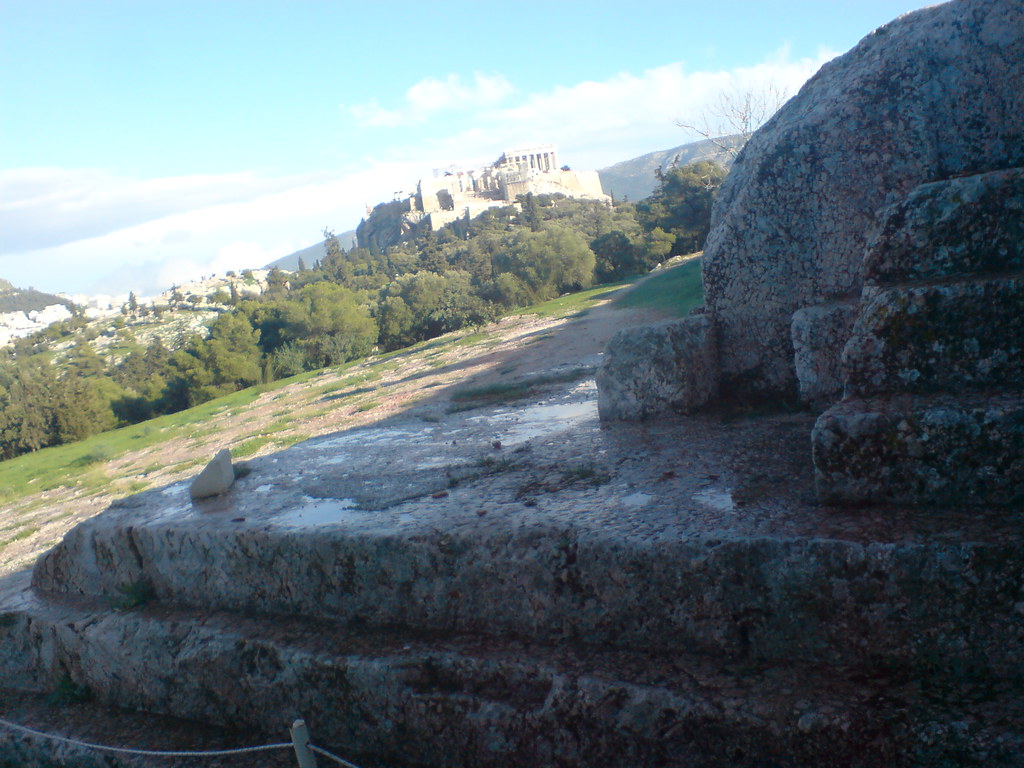Update: Το 2019 διοργανώθηκε το ομώνυμο συνέδριο στην ΑΘήνα. Πόσο χαρούμενος που έγραψα το ποστ το 2013!!!! Γράφω και εδώ ότι μου το είχε πει η Λίνα..
Θα είμαι ειλικρινής. ΔΕΝ είχα προγραμματίσει το παρακάτω ποστ, αλλά βρήκα στο βιβλίο "Ξαναδιαβάζοντας τον Φρόυντ" του Γιώργου Βαμβαλή τυχαία, το κεφάλαιο 10 κάτι που δε γνώριζα, ότι ο Φρόυντ είχε επισκεφτεί την Αθήνα και την Ακρόπολη και έγραψε κάτι που για μένα είναι το ιδανικό μότο του ελληνικού τουρισμού σήμερα (και πάντα). Είπε λοιπόν για την εμπειρία του στην Ακρόπολη ο Ζίγκι:
 |
| Acropolis |
"Υπάρχουν όλα αυτά έτσι, όπως τα μάθαμε στο σχολείο;"
Σοκ και Δέος. Σε επιστολή του σε ένα φίλο του χρόνια μετά, ο Φρόυντ μιλάει για τη διαταραχή μνήμης που έπαθε όταν είδε την Ακρόπολη. Εδώ η επιστολή A Disturbance of Memory on the Acropolis.
Λέει ακριβώς ο άνθρωπος που κρατούσε ημερολόγιο μικρός στα Αρχαία Ελληνικά:
We could not believe that we were to be given the joy of seeing Athens." ......
..."It is not true that in my school days I ever doubted the real existence of Athens. I only doubted whether I should ever see Athens. It seemed to me beyond the realms of possibility that I should travel so far - that I should 'go such a long way'.[...]
Το city break ή η επίσκεψη του Ζίγκι στην Αθήνα το 1904
Ο Φρόυντ δεν είχε προγραμματίσει την επίσκεψή του στην Αθήνα. Πήγε τυχαία από το πλοίο που πήγαινε Τεργέστη- Πόλη και ήρθε για ένα τριήμερο. Για την επίσκεψή του στην Ακρόπολη φόρεσε το καλύτερό του πουκάμισο και τη πρώτη μέρα που ανέβηκε έμεινε 2 ώρες, τη δεύτερη όλη μέρα.
Ακριβώς αυτό. Αυτή είναι η Ακρόπολη.
Γράμμα στο Ρομαίν Ρολλάν, Ιανουάριος 1936, γραμμένο τρία χρόνια πριν από τον θάνατό του:
Άλλη μία λεπτομέρεια από το ταξίδι του προς την Αθήνα.
Το βαθύτερο νόημα της διαταραχής του Ζίγκι
Υπάρχουν έρευνες που μελετάνε την επίδραση της Ακρόπολης και της Αθήνας στο Ζίγκι, κάτι λίγο πολύ γενικά άγνωστο. Στο τέλος της ζωής του ο Ζίγκι έγραφε για να διαλύσει το πατριαρχικό πρότυπο του πατέρα του και του Μωυσή.... Διαβάστε εδώ και έχω βάλει παρακάτω κάποια αποσπάσματα από την εργασία Freud's " Disturbance of Memory on the Acropolis" Revisited.
For, as I intend to show, at the time of his momentary astonishment, Freud's secret ambition to topple and replace Moses, both as lawgiver and as deliverer of the Jews, was stirred up on the Acropolis.
" Freud, in the Open Letter's last few sentences, states that his standing on the Acropolis in Athens signified the fulfilment of a forbidden wish, the wish to excel one's father, and that the derealization or his fleeting disbelief in the Acropolis kept him from acknowledging that this impious wish has been realized:
I might that day on the Acropolis have said to my brother: 'Do you still remember how, when we were young, we used day after day to walk on the same streets on our way to school, and how every Sunday we used to go to the Prater or on some excursion we knew so well? And now, here we are in Athens, and standing on the Acropolis! We really have gone a long way!'. . . It must be that a sense of guilt was attached to the satisfaction in having gone such a long way: there was something about it that was wrong, that from earliest times had been forbidden. . . . It seems as though the essence of success was to have got further than one's father, and as though to excel one's father was still something forbidden.
. . . The very theme of Athens and the Acropolis in itself contained evidence of the son's superiority. Our father had been in business, he had had no secondary education, and Athens could not have meant much to him. Thus what interfered with our enjoyment of the journey to Athens was a feeling of filial piety . . . (pp. 247-8; Freud's italics.)
And it is here that Freud is holding back: the "feeling of filial piety" which interfered with his enjoyment on τhe Acropolis pertained not only to his deceased father, Jakob, whom he has excelled, but also to Moses, whom Freud, since before the turn of the century, has been secretly bent on surpassing.
After writing the last sentence of Moses and Monotheism and placing his pen on his antiquities covered desk, did this lonely and unknown fighter for the human rights of his beseiged nation lift his precious "Athene," and to that virgin goddess of wisdom and of war make a silent prayer?
Η Αθήνα που λέει το κείμενο αναφέρεται ως ένα αρχαία άγαλμα της Αθηνάς που είχε στην κατοχή του ο Ζίγκι "Freud retrieved from Bonaparte, who had smuggled it out of Austria for him, his 41/8-inch bronze statuette of Athena (Jones, 1957, 227-8)".
'So all this really does exist, just as we learnt it at school!'
Σχόλια